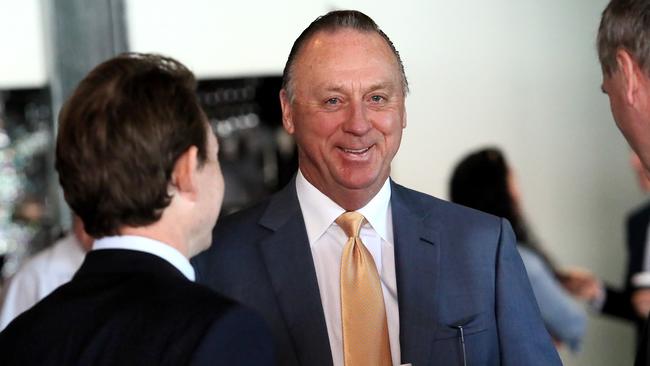Mark McGowan mining deal a $200m royalties win for tycoon
A mining company controlled by one of Perth’s richest men will receive well over $200m in royalty refunds from WA taxpayers.

A mining company controlled by one of Perth’s richest men will receive well over $200m in royalty refunds from West Australian taxpayers after the government failed to include a price cap in its agreement with the group.
Mineral Resources has reaped more than $1bn in earnings from the Koolyanobbing iron ore mine, including almost $600m in the past six months, after it struck a deal to take over the operation in June 2018.
While the mine is generating huge profits for MinRes off the back of soaring iron ore prices, the company does not have to pay a cent in royalties due to a five-year royalty holiday negotiated with the office of WA Premier Mark McGowan when MinRes agreed to take over the mine.
Unlike other royalty assistance packages signed by other WA governments, the Koolyanobbing agreement did not include any clause that would see the royalty relief fall away if iron ore prices surged.
MinRes’ billionaire founder and biggest shareholder Chris Ellison, who is also the owner of Perth’s most expensive home, is renowned as one of the best negotiators in WA’s resources sector. His head of government relations at the time of the Koolyanobbing deal was former federal Labor resources minister Gary Gray, who is now serving as Australia’s ambassador to Ireland.
The financial impact of the deal was disclosed in the WA Treasury’s mid-year financial update in 2018, with the royalty holiday for MinRes initially estimated at $83.3m over four years. But the cost of the assistance has been steadily written up, with the numbers again being increased in pre-election financial projections released by WA Treasury last week.
The royalties now expected to be rebated to MinRes total about $218m, and could swell further if iron ore prices hold at their current levels. Treasury modelling is based on iron ore averaging just $US65.60 a tonne next financial year, almost $US100 a tonne less than current prices.
MinRes latest half-year financial report, released last week, detailed how record iron ore production and soaring prices had more than doubled the group’s earnings.
Liberal MP Mike Nahan, a former treasurer, said the Premier’s office would have had to ignore the advice of the Treasury and the Department of Mines in agreeing to the deal. “Boy, did (Chris Ellison) get a good deal, and fair enough to him,” Mr Nahan said. “But it was a big mistake. They just wasted millions of dollars. There was a very bad deal negotiated by the government.”
He said WA governments had previously ensured any royalty relief had a fixed price cap that would see it drop away if prices climbed through a certain level.
The government was left scrambling to find a party to take over Koolyanobbing in 2018 after its then-owner, US company Cliffs, announced the mine would close due to low prices. MinRes, which owned the depleted Carina iron ore mine nearby, was the logical owner and the deal was negotiated with representatives of the Premier’s office.
The iron ore spot price has jumped from less than $US65 a tonne at the time of the deal to more than $US160 today, transforming the mine from a marginal operation into a cash machine for MinRes.
A spokesman for Mr McGowan said the focus at the time was to protect jobs. The fate of the port at Esperance was also a concern. “Without the acquisition, the mine would have closed, hundreds of jobs would have been lost, and royalties, taxes and port charges would no longer have been received, and the impact on Esperance would have been dire,” he said.
A spokesman for Mineral Resources said the deal had safeguarded hundreds of jobs and it had since invested nearly $350m at Koolyanobbing and Esperance. “No one — at Mineral Resources, within government or in the capital markets — has foreseen the strength and length of the unexpected increase in the iron ore price,” he said.




To join the conversation, please log in. Don't have an account? Register
Join the conversation, you are commenting as Logout